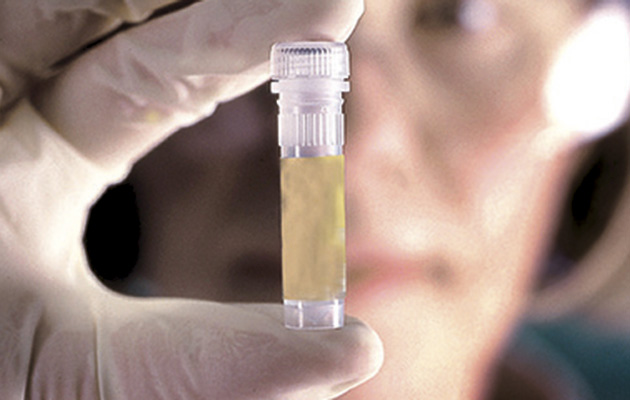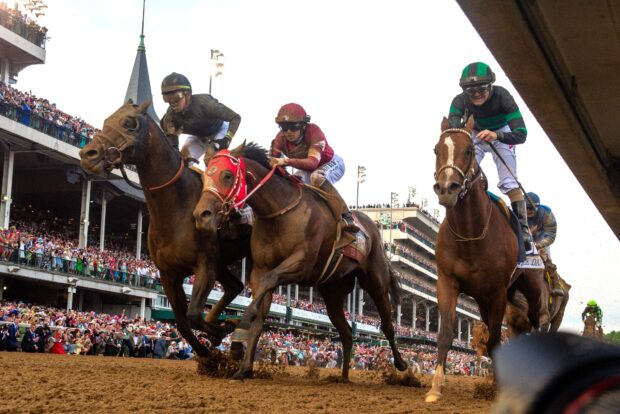Kentucky Derby winner Medina Spirit faces possible disqualification from the world-famous race after allegedly failing a dope test that may have been caused by an anti-fungal cream.
Trainer Bob Baffert told a press conference on Sunday (9 May) that the three-year-old colt (Protonico x Brilliant Speed) had tested positive for 21 picograms of betamethasone, and repeatedly denied the horse had ever been given the drug.
Betamethasone is a corticosteroid with anti-inflammatory and immunosuppressive properties, used for the treatment of dermatological, rheumatic and allergic diseases, and is not permitted to be in a horse’s system on racedays.
“All I can tell you is betamethasone, even though it’s an allowed drug, [a] therapeutic medication, we did not give it. Medina Spirit has never been treated with betamethasone,” he said, adding that the news was “the biggest gut punch in racing for something I didn’t do”.
“It’s disturbing, it’s an injustice to the horse. I don’t know what’s going on in racing right now, but there’s something not right. I don’t feel embarrassed, I feel like I was wronged. We are going to do our own investigation, we are going to be transparent with the [Kentucky Horse] Racing Commission, like we’ve always been.”
Yesterday (11 May), Mr Baffert released a statement via his legal team suggesting that an anti-fungal cream, used to treat dermatitis on the horse’s hind (pictured) “could explain the test results”.
The statement said Mr Baffert was informed by the Kentucky Horse Racing Commission on 8 May that Medina Spirit “had allegedly tested positive for 21 picograms of betamethasone”.
“[The next day], I held a press conference in which I stated that I intended to thoroughly investigate how this could have happened and that I would be completely transparent throughout the process,” it said.
“I immediately began that investigation, which has resulted in me learning of a possible source for the betamethasone, and now, as promised, I want to be forthright about what I have learned.
“Following the Santa Anita Derby [3 April], Medina Spirit developed dermatitis on his hind end. I had him checked out by my veterinarian who recommended the use of an anti-fungal ointment called Otomax. The veterinary recommendation was to apply this ointment daily to give the horse relief, help heal the dermatitis, and prevent it from spreading. My barn followed this recommendation and Medina Spirit was treated with Otomax once a day up until the day before the Kentucky Derby [1 May]. Yesterday, I was informed that one of the substances in Otomax is betamethasone.”
The statement added that while they “do not know definitively” that this was the source of the “alleged” betamethasone in the horse’s post-race blood sample, Mr Baffer has “been told by equine pharmacology experts that this could explain the test results”.
“As such, I wanted to be forthright about this fact as soon as I learned of this information,” the statement continued.
“As I have stated, my investigation is continuing and we do not know for sure if this ointment was the cause of the test results, or if the test results are even accurate, as they have yet to be confirmed by the split sample.
“However, again, I have been told that a finding of a small amount, such as 21 picograms, could be consistent with application of this type of ointment. I intend to continue to investigate and I will continue to be transparent. In the meantime, I want to reiterate two points I made when this matter initially came to light.
“First, I had no knowledge of how betamethasone could have possibly found its way into Medina Spirit (until now) and this has never been a case of attempting to game the system or get an unfair advantage.
“Second, horse racing must address its regulatory problem when it comes to substances which can innocuously find their way into a horse’s system at the picogram (which is a trillionth of a gram) level. Medina Spirit earned his Kentucky Derby win and my pharmacologists have told me that 21 picograms of betamethasone would have had no effect on the outcome of the race. Medina Spirit is a deserved champion and I will continue to fight for him.”
Churchill Downs has stated that if the positive sample is confirmed, the horse will be disqualified and Mr Baffert will be suspended from entering horses at the course.
“It is our understanding that Kentucky Derby winner Medina Spirit’s post-race blood sample indicated a violation of the Commonwealth of Kentucky’s equine medication protocols,” said a statement from Churchill Downs on 9 May.
Continues below…

Owner’s hairspray causes showjumper’s positive dope test
The rider and the owner’s wife were unaware he was using the product

Concern at number of positive dope tests caused by humans’ stable wees

Subscribe to Horse & Hound magazine today – and enjoy unlimited website access all year round
“The connections of Medina Spirit have the right to request a test of a split sample and we understand they intend to do so.
“To be clear, if the findings are upheld, Medina Spirit’s results in the Kentucky Derby will be invalidated and Mandaloun will be declared the winner.
“Failure to comply with the rules and medication protocols jeopardises the safety of the horses and jockeys, the integrity of our sport and the reputation of the Kentucky Derby and all who participate. Churchill Downs will not tolerate it.
“Given the seriousness of the alleged offense, Churchill Downs will immediately suspend Bob Baffert, the trainer of Medina Spirit, from entering any horses at Churchill Downs Racetrack.
“We will await the conclusion of the Kentucky Horse Racing Commissions’ investigation before taking further steps.”
Horse & Hound magazine, out every Thursday, is packed with all the latest news and reports, as well as interviews, specials, nostalgia, vet and training advice. Find how you can enjoy the magazine delivered to your door every week, plus options to upgrade to access our H&H Plus online service which brings you breaking news as it happens as well as other benefits.




